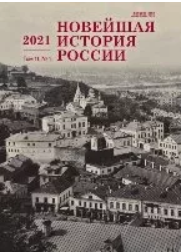Украинские националисты в Омске: осуждены и реабилитированы
Ukrainian Nationalists in Omsk: Prosecuted and Vindicated
Author(s): A. V. SushkoSubject(s): Political history, International relations/trade, Political behavior, Politics and society, Nationalism Studies, WW II and following years (1940 - 1949)
Published by: Издательство Исторического факультета СПбГУ
Keywords: Ukrainian nationalism; OUN/UPA; “Yunatstvo”; Western Ukraine; Dragobychsky region; Great Patriotic War; deportees; Omsk; political repressions; vindication;
Summary/Abstract: The article reviews actions of Omsk Region Office of Ministry of State Security (MSS) towards politically active Ukrainian nationalists among deportees from the Dragobychsky region of Western Ukraine and assesses their vindication in the Russian Federation. This study is based on archival documents from legal prosecutions of Ukrainian deportees stored in the Records Office of Omsk Region of Federal Security Service and recently opened for scholarly review, as well as exhibits from the History section of the Omsk Office of the FSB. Legal prosecutions documents were analysed using a prosopographic method to reconstruct a typical picture of young Ukrainian deportees who continued to believe in the values of Ukrainian nationalism and kept connections with the Organization of Ukrainian Nationalists (OUN)/Ukrainian Insurgent Army (UPA). All prosecuted Ukrainians were driven to nationalism by conditions of their upbringing. The young men were deportees from Western Ukraine and of peasant origin. The OUN/UPA were widely supported by the rural population in this region. They were deported to Siberia as family members of UPA militias fighting against the Soviet army. Having nationalist views, all prosecuted young men sincerely supported the creation of an independent Ukrainian state and did not accept Soviet authority that did not allow this creation, and so they were deported from their homeland. Omsk MSS agents, together with their Ukrainian colleagues, identified young radical nationalists. Some of those were active members of underground militant groups and during World War II carried out intelligence requests for OUN/UPA and provided information for its members. The author concludes that the nationalistic activities of these Ukrainian youth were are a real threat to security of the Soviet state and as such the fact of their vindication in the Russian Federation is not well-grounded from historical point of view.
Journal: Новейшая история России
- Issue Year: 11/2021
- Issue No: 3
- Page Range: 705-722
- Page Count: 18
- Language: Russian

